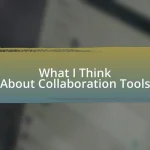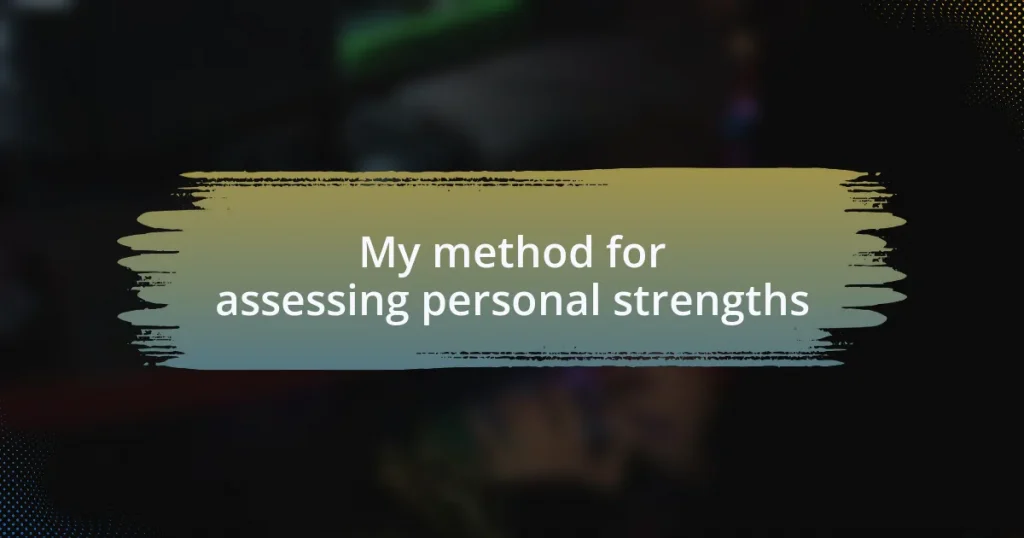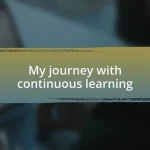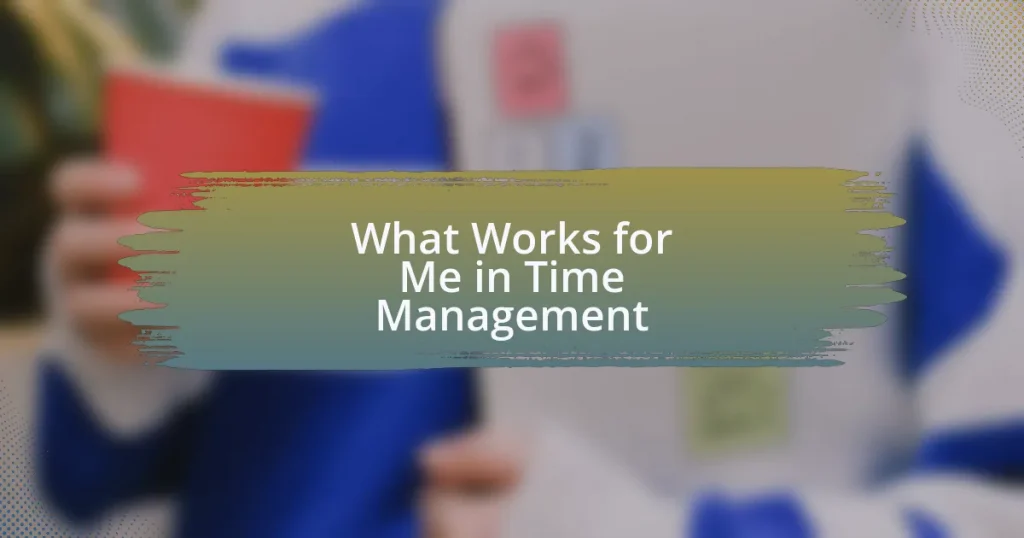Key takeaways:
- Assessing personal strengths is an ongoing journey that enhances confidence and aligns efforts with passions, leading to personal and professional growth.
- Various assessment methods, including self-reflection, peer feedback, and standardized tests, provide valuable insights into one’s strengths.
- Applying strengths in specific contexts, like web development, can enhance teamwork and problem-solving skills, while embracing a growth mindset fosters continuous learning and development.
Author: Charlotte Everly
Bio: Charlotte Everly is an accomplished author known for her evocative storytelling and richly drawn characters. With a background in literature and creative writing, she weaves tales that explore the complexities of human relationships and the beauty of everyday life. Charlotte’s debut novel was met with critical acclaim, earning her a dedicated readership and multiple awards. When she isn’t penning her next bestseller, she enjoys hiking in the mountains and sipping coffee at her local café. She resides in Seattle with her two rescue dogs, Bella and Max.
Introduction to personal strengths
Personal strengths are like hidden gems within us, waiting to be discovered and polished. I remember a time when I stumbled upon my knack for problem-solving during a challenging project. This realization not only boosted my confidence but also motivated me to tackle even tougher challenges ahead. Have you ever reflected on your own strengths in a similar fashion?
Strengths can range from technical skills, like coding, to interpersonal abilities, such as communication. I realized early in my career that my ability to connect with others often opened doors that technical skills alone couldn’t. This understanding shaped my approach to collaboration, allowing me to leverage my strengths for team success. What strengths have you found that enhance your work or personal life?
Assessing personal strengths is an ongoing journey rather than a one-time event. Recently, I took time to evaluate my skills and interests, which led me to new opportunities I hadn’t considered before. This experience underscored a vital question: How often do we take the time to reassess what we truly excel at and enjoy? Finding the answers can lead to profound personal and professional growth.
Importance of assessing strengths
Recognizing and assessing personal strengths is crucial because it lays the foundation for growth and improvement. I recall attending a workshop where participants were encouraged to explore their unique abilities. The insights I gained about my analytical skills not only surprised me but also helped me carve a clearer path toward my career goals. When was the last time you truly assessed your strengths?
Moreover, understanding what you excel at can significantly enhance your confidence. I remember a project where I had to lead a team, and my strong organizational skills became apparent. I felt a sense of pride that came from utilizing a skill I had underappreciated until that moment. Isn’t it empowering to realize that what you already possess can take you further than you think?
Assessing strengths also enables us to align our efforts with our passions, leading to more fulfilling outcomes. For instance, when I evaluated my expertise in web development, I discovered a profound interest in user experience design. This not only fueled my enthusiasm for learning more but also transformed how I approached my projects. Have you considered how your strengths might align with your interests for better personal satisfaction?
Overview of assessment methods
When it comes to assessing personal strengths, various methods can provide valuable insights. One effective approach I’ve found is self-reflection, where I take time to think deeply about my experiences and identify moments when I felt particularly competent. Have you ever noticed how a quiet moment can reveal so much about what you excel at? This method allows for honest introspection, often surfacing skills I hadn’t consciously recognized.
Another useful technique is feedback from peers or mentors. I once asked a close colleague what they saw as my greatest strengths during a team project. The feedback was enlightening; it helped me see aspects of my leadership style that I hadn’t fully appreciated, like my ability to resolve conflicts effectively. Have you reached out to someone for their perspective? Sometimes an external lens can illuminate your capabilities in ways you hadn’t imagined.
Finally, utilizing standardized assessments can offer structured insights into personal strengths. I remember taking a strengths inventory that highlighted my adaptability and problem-solving skills. It felt validating to see my abilities quantified, reinforcing my confidence in tackling complex challenges. Have you considered exploring such assessments to map out your strengths? They can guide you in making more informed decisions about your career paths and personal development.
My step-by-step evaluation process
To evaluate my personal strengths effectively, I always start with a self-assessment worksheet I’ve designed. I jot down my experiences and list the skills I employed during those moments. One time, I reflected on a particularly challenging project I led, and identifying the strategic decisions I made gave me a clearer picture of my leadership capabilities. Have you ever considered writing down your experiences to spot patterns in your strengths?
Next, I engage in casual conversations with friends and colleagues. I often ask them what qualities they admire in me. During a recent coffee chat, a friend pointed out my knack for simplifying complex topics, which was an eye-opener. It’s amazing how an informal setting can spark valuable insights—have you thought about what your friends might say about your strengths?
Lastly, I incorporate mindfulness exercises into my evaluation process. Taking a few minutes to meditate on my achievements allows me to connect with my emotions and recognize what truly resonates with me. After a session, I often feel empowered by acknowledging my journey and the skills I’ve developed along the way. How often do you take a moment to appreciate your personal growth? It’s a simple yet powerful tool for understanding your strengths better.
Tools for identifying strengths
When it comes to identifying strengths, I often turn to online assessments and quizzes. The insight I gained from a recent StrengthsFinder test was remarkable; it highlighted my top five strengths, including strategic thinking and adaptability. Have you ever taken an assessment that surprised you? It’s fascinating how these tools can illuminate traits we might overlook in ourselves.
In addition, I find value in project management tools like Trello or Asana, where I track my tasks and progress. By reflecting on which projects energize me the most, I can pinpoint specific strengths in problem-solving or creativity. I remember feeling particularly thrilled when I completed a design project that received positive feedback. What projects have you worked on that made you feel proud? They can reveal a lot about your strengths.
Lastly, I like to keep a “brag file,” where I collect positive feedback and commendations from colleagues and clients. Revisiting these notes is not only uplifting but also helps me recognize consistent themes in my work. One day, I read through my file and was struck by how many clients noted my attention to detail. Have you kept track of compliments you’ve received? It can be a powerful reminder of your unique abilities.
Tips for interpreting results
When interpreting the results of personal assessments, I recommend looking for patterns rather than focusing solely on individual scores. During my first assessment, I was surprised by my low rating in public speaking. However, reflecting on my experiences, I realized I felt more confident when speaking about topics I’m passionate about. Has something similar ever happened to you?
It’s also crucial to consider the context in which your strengths manifest. I recall the time when I thought my strength in collaboration was more about playing supporting roles. But as I took on leadership tasks, I discovered my ability to rally a team and foster a shared vision. Isn’t it enlightening how our strengths can adapt to different situations?
Finally, don’t hesitate to discuss your results with others. Sharing insights can lead to deeper understanding. I once talked to a mentor about my assessment results, and it opened my eyes to skills I hadn’t even considered strengths before. What conversations have reshaped your perspective on your abilities? These discussions can be incredibly enriching.
Applying strengths in web development
When I think about applying my strengths in web development, I often realize how crucial it is to align those strengths with the right projects. For example, my detailed-oriented nature really shines when I’m debugging code. I find joy in dissecting complex problems and piecing together the solutions. Have you ever felt that sense of satisfaction when you finally resolve a tricky issue?
Additionally, leveraging my communication skills has transformed my approach to teamwork. A memorable moment came during a collaborative project where I took the lead in bridging the gap between design and development. Not only did it enhance our workflow, but it also fostered a culture of open dialogue and creativity. Have you ever witnessed how effective communication can elevate a team’s performance?
I’ve also learned that embracing a growth mindset is vital. Early in my web development journey, I struggled with certain frameworks. Instead of shying away from them, I leaned into my strength of perseverance. As I invested the time to learn, I not only improved my technical skills but also built a newfound confidence in tackling challenges. What have you done to embrace your learning curve in web development?















